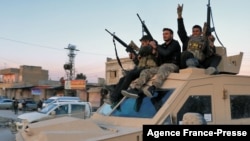U.S.-backed Kurdish forces Sunday announced the end of their mop-up operations in a major prison in northeast Syria, days after recapturing the facility from militants affiliated with the Islamic State terror group.
The Kurdish-led Syrian Democratic Forces (SDF) said they ended “the sweep campaign in al-Sina’a prison” in the city of Hasakah, after clearing “the last pockets in which [IS] terrorists were present.”
The Sunday announcement came four days after the SDF took control of the detention facility following a weeklong clash with IS militants who attacked the prison in an attempt to free thousands of IS prisoners held there.
U.S. officials said following the attack and ensuing clashes, the detainees have been relocated to another facility with higher security to prevent further attacks by IS militants.
“This was a huge ISIS failure that ultimately sped up the clock to ensuring that the detainees are in a hardened facility from which they will never escape,” Brigadier General Isaac Peltier, commander of Special Operations Joint Task Force-Operation Inherent Resolve, said in a statement on Sunday, using an acronym for the militant group.
With support from the U.S.-led coalition against IS, the SDF contained the threat by establishing a perimeter around the detention center, the statement added.
SDF’s media center said Sunday the group will soon issue “a detailed statement on the recent attack on the prison,” but a war monitor said the recent clashes in Hasakah left 373 people dead.
The British-based Syrian Observatory for Human Rights reported on Sunday that 268 IS fighters, 98 SDF-linked fighters and seven civilians were killed in the fighting.
Hoshang Hasan, a local reporter who covers events in Hasakah, said Kurdish-led forces were continuing their combing operations in neighborhoods near the facility.
“After the remaining IS militants inside the prison completely surrendered to the SDF, local forces are now sweeping two nearby neighborhoods to ensure a full control of the vicinity,” he told VOA.
This story originated in VOA’s Kurdish Service.




